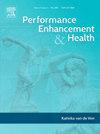成功:调查女性力量举重运动员的身体形象和健康状况
IF 3.7
Q2 HOSPITALITY, LEISURE, SPORT & TOURISM
引用次数: 0
摘要
在体重类运动中,有目的的减肥(PWL)通常在比赛前进行,以获得较低体重的表现优势。研究人员在力量举重运动员中调查了PWL与心理结果的关系。然而,考虑到PWL的心理结果的调查可以扩展到包括(1)更广泛的心理学概念和(2)PWL动力学的更细微差别。为了解决这些研究空白,本研究的目的是研究女性力量举重运动员在PWL比赛期间的身体形象和幸福感。采用非实验性纵向设计,女性举重运动员(N = 12;年龄= 29.42岁,年龄= 9.23岁)在10周内的5个时间点上自我报告的体重、身体形象和幸福感。身体形象是用身体欣赏量表-2和一个单项指标的形状和体重满意度来测量的。幸福感是用华威爱丁堡心理健康量表来测量的。在正式比赛称重时,参与者的体重平均减少了3.44公斤(SD = 1.14公斤)。每个响应变量(身体欣赏/形状满意度/体重满意度/幸福感)使用一个合并时间序列回归分析来检验与体重的时间关联。体重预测体重满意度(B = 0.40, p <;.001)和幸福感(B = -0.19, p <;措施)。可以得出结论,在为期9周的PWL期间,女性力量举重运动员报告了体重满意度和幸福感的改善。这些发现有助于理解女性力量举重运动员在准备比赛时逐渐减肥的心理结果。本文章由计算机程序翻译,如有差异,请以英文原文为准。
Making the cut: Investigating body image and well-being among female powerlifters
In weight-category sports, purposeful weight loss (PWL) is often undertaken preceding a competition to gain a performance advantage at a lower body weight. Researchers investigating PWL among powerlifters have identified associations to psychological outcomes. Yet investigations considering the psychological outcomes of PWL can be expanded to include (1) broader conceptualizations of psychological concepts and (2) greater nuance for the dynamics of PWL. Moving towards addressing these research gaps, the purpose of this study was to examine body image and well-being in female powerlifters during a period of PWL surrounding competition. Using a non-experimental longitudinal design, female powerlifters (N = 12; Mage = 29.42, SDage = 9.23 years) self-reported body weight, body image, and well-being at five timepoints over 10 weeks. Body image was measured using the Body Appreciation Scale-2 along with a single-item indicator of shape and weight satisfaction. Well-being was measured using the Warwick Edinburgh Mental Well-Being Scale. At the time of official competition weigh-in, participants lost an average of 3.44 kg of body weight (SD = 1.14 kg). One pooled time series regression analysis was used per response variable (body appreciation/shape satisfaction/weight satisfaction/well-being) to test the temporal association with body weight. Body weight predicted weight satisfaction (B = 0.40, p < .001) and well-being (B = –0.19, p < .001). It can be concluded that during a nine-week period of PWL female powerlifters reported improvements in weight satisfaction and well-being. These findings help to understand psychological outcomes for gradual weight loss practices among female powerlifters when preparing to compete.
求助全文
通过发布文献求助,成功后即可免费获取论文全文。
去求助
来源期刊

Performance enhancement and health
Social Sciences-Health (social science)
CiteScore
4.70
自引率
0.00%
发文量
27
审稿时长
57 days
 求助内容:
求助内容: 应助结果提醒方式:
应助结果提醒方式:


